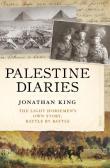 8634674088197141487.jpg
8634674088197141487.jpg
 8634674088197141487.jpg
8634674088197141487.jpg
'Culminating with the cavalry charge at Beersheba on 31 October 1917, Palestine Diaries is the story of Australia's Light Horsemen of WWI, told in their own brutally honest words - day by day, battle after bloody battle.
'One hundred years after that now-legendary battle - widely considered the last great cavalry charge - Dr. Jonathan King argues that the breathtaking achievement of the 4th Light Horse Brigade should become the cornerstone of our national identity.
'The soldiers in these pages were the first to achieve incredible victories for their new nation - ahead of the Western Front, and unlike the defeats of Gallipoli. These young Australians helped demolish the centuries-old Ottoman Empire by driving the Turks from the strategic Suez Canal across the Sinai, and up through Palestine, Jordan, and Syria to be first into the enemy stronghold of Damascus - a victory that would not only change the course of the war, but would also plant the seeds of the modern Middle Eastern conflicts.
'Published together here, many for the first time, are the diaries, letters, and photos of those brave young men, whose service and sacrifice helped shape a nation.' (Publication summary)
'Australia’s role in the war against the Ottoman Empire from 1916 to 1918 is much less widely understood than its contribution to the doomed campaign in the Dardanelles or the muddy slog on the Western Front. It is one aspect of Australia’s World War I that has not been overwritten by historians (loosely termed), and thus offers Jonathan King considerable scope to make a meaningful contribution to Australia’s popular understanding of World War I. Unfortunately and unsurprisingly given how much pulp history the centenary of World War I has generated, the result is farcical.' (Introduction)
'Australia’s role in the war against the Ottoman Empire from 1916 to 1918 is much less widely understood than its contribution to the doomed campaign in the Dardanelles or the muddy slog on the Western Front. It is one aspect of Australia’s World War I that has not been overwritten by historians (loosely termed), and thus offers Jonathan King considerable scope to make a meaningful contribution to Australia’s popular understanding of World War I. Unfortunately and unsurprisingly given how much pulp history the centenary of World War I has generated, the result is farcical.' (Introduction)